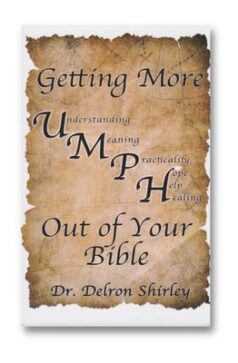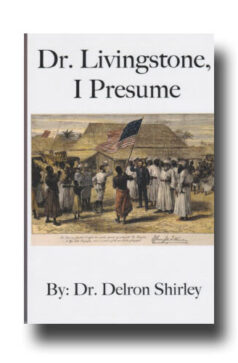At some point or another in our lives, we have all stood on the bank of a pond, dropping in pebbles and watching the ripples race across the surface of the pond in ever-increasing circles until they disappear at the far shore. I’m certain that you are as amazed as I am that a single pebble can have such far-reaching influence and make its impact known across the whole of the pond. The same thing is true in the spirit realm; each Christian’s life exerts a ripple effect — with even tidal wave potential — in the world around him.
The first area of influence we have is upon ourselves. In I Samuel chapter thirty, we read the story of the devastation that David encountered at Ziklag. With their wives and families taken captive, their city burned, and their possessions stolen, David’s men had turned against him and spoke of stoning him. Standing alone with no one left to support him, David knew only one thing to do — he encouraged himself in the Lord. (verse 6) He recognized that the first area of influence he had was over himself. Before he could muster his men to pursue the marauders and free their kidnapped families and take back their stolen goods, he knew that he had to bolster his own faith and willpower. His son, the wise King Solomon, would later pen the words, “As a man thinks in his heart, so is he,” (Proverbs 23:7) which seems to depict the truth that permeated his father’s spirit that day. Solomon lets us know that it is not what we think about, but the way we think about it that determines our destiny. On that fateful day with his future and the future of his men and the nation as a whole hanging in the balance, David had no choice but to think about his loss and that of his men; he had no choice but to think about those men who had served him loyally through thick and thin but were today threatening mutiny. However, he did have a choice concerning how he was going to think about these things. He made a choice to think about reclaiming the losses inflicted by the invaders rather than to hang his head in defeat; he made a choice to remember the extreme bravery and dedication his men had displayed over their time of service in his ranks rather than to distress himself with their present threats. As the Apostle Paul would note in the New Testament some one thousand years later, he chose to think on things that were of a good report. (Philippians 4:8) He determined to have a positive influence over himself — the first circle over which he held sway.
Our families are the next area of the pond to be taken in by the ever-expanding wave set in motion by that one pebble. In his first epistle, the Apostle Peter wrote of the influence of a wife, saying that she can win her husband to the faith simply through her chaste lifestyle. (verse 3:1) He followed a few verses later with an admonition to Christian husbands to properly respect their wives lest their prayers be hindered. (verse 3:7) In the story of the great patriarch Abraham, we can see the importance of properly fulfilling our responsibilities within this area of influence; the Lord determined to give him revelation of the future and great blessings on the grounds of one criterion — that he would command his children properly after him. (Genesis 18:17-19) Church leaders, before they are allowed to accept authority in the congregation, are examined to ensure that they were properly exerting influence in their homes. (I Timothy 3:4)
In Psalm 127:3-4, we learn that our children are our heritage and that they are like arrows in our hands, an illustration that suggests a story told in chapter thirteen of II Kings. As the prophet Elisha lay waning on his deathbed, he called King Joash into his chamber. There he instructed him to take his arrows and strike the ground. When the king smote the floor only three times, the prophet angrily reprimanded that he should have thrashed the ground five or six times indicating total destruction of his enemies. Certainly, this story from history can become parabolic, teaching us that we must exert the full impact of our wave of authority as it ripples through the lives of our children; it is through them that our full impact against the enemies of our influence will be felt.
The next area of influence that our expanding circle laps into is the church. In I Thessalonians 1:5, Paul made one simple statement that reveals five ways through which he exerted his influence in the church.
For our gospel came not unto you in word only, but also in power, and in the Holy Ghost, and in much assurance; as ye know what manner of men we were among you for your sake.
The first avenue he mentioned was the Word — teaching and preaching solidly based on the Bible. His second avenue was power. All we need is a quick review of the book of Acts to see that his ministry was indeed accompanied with miraculous events. (Acts 13:11, 16:16-18, 19:11, 20:9-10, 28:3-6) However, we may be tempted to relegate such supernatural occurrences to ancient history or to the lives of such men of stature as this apostle of the faith. The truth is that this same supernatural assistance is available for — and actually expected to be operative in — the ministry of all believers. (Mark 16:17-18)
Next, Paul mentioned the Holy Ghost. In that the operation of the gifts seems to have been his topic in the previous category, we must interpret this reference to suggest a fuller meaning of the operation of the Holy Spirit in the believer’s life. Turning to his letter to the Galatians, we see at least two areas where the Holy Spirit’s influence must be evidenced in a believer’s life and ministry. The first is in chapter five verses sixteen and eighteen: walking in and being led by the Spirit. The other Holy Spirit quality that Paul discussed in Galatians chapter five is the fruit of the Spirit listed in verses twenty-two and twenty-three. Just as no one cares for a barren tree that does not produce fruit (Matthew 21:19, Luke 13:6-7), people will not be attracted to our lives unless we manifest the fruit of the Spirit.
Paul followed with the quality of assurance. We can recognize from the natural world that we never want to believe what someone is saying if we don’t feel like he really believes it himself. I know that I’d never buy a car from a salesman if I saw him driving another make. Paul was persuaded of the validity of his message (Romans 8:38, 14:14, II Timothy 1:12) and admonished his disciples to be fully persuaded concerning their faith. (Romans 14:5)
Character is the fifth avenue through which Paul conveyed his gift. In our Thessalonian passage, he called it, “manner of man.” To get a definition of this term, we can turn to his farewell to the Ephesian church where he again used this same expression and gave a rather lengthy explanation.
And when they were come to him, he said unto them, Ye know, from the first day that I came into Asia, after what manner I have been with you at all seasons, Serving the Lord with all humility of mind, and with many tears, and temptations, which befell me by the lying in wait of the Jews: And how I kept back nothing that was profitable unto you, but have shewed you, and have taught you publickly, and from house to house, testifying both to the Jews, and also to the Greeks, repentance toward God, and faith toward our Lord Jesus Christ… Wherefore I take you to record this day, that I am pure from the blood of all men. For I have not shunned to declare unto you all the counsel of God…Therefore watch, and remember, that by the space of three years I ceased not to warn every one night and day with tears…I have coveted no man’s silver, or gold, or apparel. Yea, ye yourselves know, that these hands have ministered unto my necessities, and to them that were with me. (Acts 20:18-34)
The purity of Paul’s motives and the unselfishness of his service permeate the speech and testify to the quality of life he lived before the people. Who he was backed up what he said. As the old expression goes, he walked the walk as well as talked the talk. Another couplet reminds us that people don’t care what you know unless they know that you care. Our personal character is likely the most powerful force as the influence of our lives ripples through the churches where we worship and minister.
Our waves of influence will soon splash into the cities where we live. For this to happen, we must possess the same compassion that Jesus demonstrated for Jerusalem when He wept over the city (Luke 19:42) and lamented that they refused Him when He desired to gather the city under His wing of loving protection and salvation (Matthew 23:37). The late Dr. Lester Sumrall expressed our roles as gatekeepers over our cities — allowing certain influences into the city and forbidding other influences from entering. True compassion — informed by spiritual insight and wisdom and empowered with spiritual authority — will allow us to exert a gatekeeper’s influence over the well being of our cities.
One dramatic example of how believers can actually become people of influence who literally change the destiny of their cities can be found in Acts chapter nineteen. The Christian community and faith grew so strong in the city of Ephesus that worship in the Temple of Diana fell off so radically that the idol makers actually stirred up a riot and tried to lynch Paul because it was in influence that had made such a dramatic change in their city. When I visited Ephesus, my tour guide showed us place after place that were associated with the great apostle. However, he only mentioned the Temple of Diana when I asked him about it. The magnificent structure that had once drawn devotees form all over the Roman Empire and had the honor of being one of the Seven Wonders of the Ancient World had essentially “fallen off the radar” in comparison to the influence of a man of faith. Paul had become the gatekeeper of the city of Ephesus. It was his city, not Diana’s!
Next, our wave of influence can lap across our nation. In some cases, we will be given platforms from which to speak into the life of our nation as the prophets of old spoke to entire nations. Although most of us will likely never be handed such a microphone, we are all given a mouthpiece that speaks directly into the ear of God. Paul admonished us to effectively and consistently speak into this receiver with intercessions for our national leaders and authorities. (I Timothy 2:1-3) In this way, we can have as (if not more) powerful influence upon our national life as those who have been granted a voice to speak to the national audience.
Just as the ripple from that one pebble continues until it disappears at the distant shoreline, God expects the influence of our lives to continue until it touches our entire world. The worldwide impact of the believers was so prominent upon the heart of our Lord that He continued to reiterate it each time He met with His disciples after His resurrection. (Matthew 28:19-20, Mark 16:15-18, Luke 24:46-49, John 20:21, Acts 1:8) For some of us, this Great Commission will be accompanied with an international platform as was given to Jeremiah who was ordained as a prophet to the nations. (Jeremiah 1:10) For others it may be again, as we have learned from I Timothy 2:1, that our voices are to be heard only in the heavenlies as we offer prayers and intercession for all men. In the life of Abraham, we can see the importance of both taking physical action on behalf of the pagan nations around us (in Genesis 14:14-16, he took action by mounting an armed force to rescue the kidnapped Sodomites and reclaim their goods) and doing spiritual battle through intercession (in Genesis 18:20-33, he prayed for the deliverance of the city). Perhaps we can also learn a further lesson from the story of Abraham’s intercession. The story implies that the patriarch didn’t realize the full scope of his influence in intercession. As he besought the Lord to show mercy on the people of the city, he continued to narrow the parameters of his request from fifty righteous to forty-five, then forty, to thirty, and twenty, and finally to just ten. Had he persisted in narrowing the field to one (II Peter 2:7), it is likely that his supplications could have saved the entire city. When Paul admonishes us to pray without ceasing (I Thessalonians 5:17), it is likely that he realized that we often stop our intercession too soon and miss the full impact of our wave of authority as it continues to expand into new areas of influence.
One concluding thought we must not overlook when meditating on our ever-increasing circle of influence is that just like the bomb blast is always most intense at ground zero and an earthquake registers its highest Richter scale reading at its epicenter, the splash from the stone is always most powerful at the point of impact. Likewise, we must always ensure that our greatest influence is always the one closest to home. The ripples will always continue to radiate if we always continue to focus on keeping the waters stirred up (John 5:4) at the center. Jesus indicated that we should first go to our local environs and then extend to the uttermost parts of the earth. (Acts 1:8) Paul was committed to reaching his own people first and then enlarging his scope to others (Romans 1:16); he admonished those who desired to be church leaders to take care of their own homes first (I Timothy 3:5); and he brought the whole matter back to the home base when he said that he was constantly taking care of himself lest he influence others and fail personally (I Corinthians 9:27). In one verse that we omitted as we surveyed Paul’s farewell speech to the Ephesian church, he left a powerful injunction to all of us who would desire to have a circle of influence in any area, “Take heed therefore unto yourselves, and to all the flock, over the which the Holy Ghost hath made you overseers.” (Acts 20:28)
What Would Jesus Do?
Before our influence successfully laps into further circles of society, our first attention must be given to our primary circle of influence — ourselves. One way that many of us have determined to control our personal influence is to ask ourselves that ever-challenging question, “What would Jesus do in this situation?”
Several years ago, this approach to life became very popularized when Janie Tinkleberg, assisted by an advertising executive in her church, developed and distributed “WWJD” bracelets to teens in her youth group. Religious and secular marketers picked up on the idea, and millions of the bracelets were sold around the world. Before long, even Buddhists are jumping on the bandwagon with a book entitled, What Would Buddha Do?, offering Buddhism’s answers to more than a hundred daily dilemmas. What would Buddha do about coffee addiction? He’d switch to tea. How would Buddha deal with road rage? He’d steer away from anger. Bryce Willet, the book’s marketer commented that a person need not be a Buddhist to appreciate the book, “Americans feel free to look for spiritual wisdom in many different traditions. They use different spiritual practices they find meaningful.” In like fashion, Tinkleberg soon came to realize that people really didn’t need to know Christ to become engulfed in the WWJD movement. When the movement began to lose its steam, she noted that she felt that it was a good thing, “I want this to fade so it will end up where it belongs — back with people wearing them who know what these little nylon bracelets really mean.”
The problem with asking ourselves what Jesus would do in any situation is that the answers will come from a faulty source — ourselves. We can only answer the questions to the level at which we actually know Jesus. If we don’t know Him very well, we humans seem to have a tendency to recreate God at will — a truth that really hits home every Easter season when we see mention in the secular magazines of a panel of scholars known as the Jesus Seminar. These academics have spent the last many years analyzing the gospels and sorting the sayings of Jesus into four groups: words to be printed in red because they are the actual words He spoke, words to be printed in pink because they possibly came from the actual lips of Jesus, words to be printed in gray because it is unlikely that Jesus actually said them, and words to be printed in black because it is the evaluation of the panel that the gospel writers penned these words and attributed them to the Lord.
It reminds me of the “quest for the historical Jesus” movement of a number of years ago. The thesis of this series of studies by some of the leading theologians of the time was the idea that each of the gospel writers portrayed Jesus as he remembered Him. If this were the case, then none of the gospels would be the true picture of Jesus; to truly know Him, we would have to look behind the gospels to find the historical figure who inspired each of the diverse writers. Using higher criticism, lower criticism, and every other technique of analysis available, these men independently came to their own conclusions as to who this man from Nazareth must have been. The results were as varied as the scholars who authored the various books. You see, the problem is that on the sixth day of the creation week God created man in His image but ever since then man has been trying to invent God in his image. One scholar with a questionable sexual orientation came up with a homosexual Jesus. One scholar came to the conclusion that there never really was an historical Jesus at all. This conclusion made me wonder if there ever was an actual “scholar” at all. I thought of the vineyard keepers in a parable that Jesus told who wanted to kill the heir so that they could take the inheritance. (Matthew 21:38) Then I concluded that these supposed scholars wanted to “kill” Jesus so they could take more than a physical inheritance — they wanted to take the very position of God. Finally, Dr. Albert Schweitzer tried to lay the whole issue of the quest for the historical Jesus to rest with his summation that he found the true Jesus not on the shores of the Galilee, but on the banks of the Congo where He had commissioned the good doctor to serve hurting humanity.
Although the WWJD idea is an extremely noble concept, it collapses upon itself if we make up the Jesus that best suits our own liking. Perhaps my feelings about the WWJD slogan were best summed up in a little Family Circus cartoon where one of the children was considering taking the last piece of cake while his siblings stood by with none. The mother admonished the boy to consider what Jesus would do. Of course, she was hoping to invoke a spirit of sharing; but she was caught off guard by his reply that Jesus would multiply the cake so that it would feed everyone!
As I read through the gospels, I am continually confronted with a Jesus who, just as He did for the boy in the cartoon, reacts quite differently from the way I expect Him to. For instance, the biblical Jesus walked into a situation where a group of His disciples had failed in their attempt to deliver a young boy who was tormented by demons. The Jesus I like to envision would have gently encouraged His followers, “It’s okay. I know that you tried your best. Let Me help you out this time and give you a couple pointers so that you can take care of the next one on your own.” Instead, He really got on their case; He read them the riot act, calling them a faithless and perverse generation! In other words, He was “on them like white is on rice.” This wasn’t the only time He treated His friends like this; careful reading of the scriptures reveals that He often upbraided them when we would have thought that He would have instructed or encouraged them. He even called Peter “Satan” when the disciple was doing what seemed to be the most noble thing possible by promising to die for his master. Even Jesus’ own mother got a surprising retort when she asked Him to help out an embarrassed young couple who had run out of wine at their wedding reception. When a desperate mother begged Him to help her demon-possessed daughter, this man — whom we expect to be such a loving Lord — responded with an insulting insinuation suggesting that she was a dog. He seemingly abandoned His closest friend by “dilly dallying” around for two days rather than responding immediately when Lazarus’ sisters sent Him a message that their terminally ill brother was in a life-threatening condition. How could this healer with the power to cure everyone walk past a multitude at the Pool of Bethesda and single out only one man to restore to health? Even though He was the one who taught us to love our enemies, He bolted into their garage sale, stared them straight in the face, and yelled, “Hypocrites!” Then He proceeded to turn over their tables and took a whip to them! I would have thought that He would have prayed for them, loved them, and offered them the other cheek after their offenses. Possibly even more puzzling is the question of why this Savior had to spend three hours in the Garden of Gethsemane praying that the cup would pass from Him before He finally yielded His will to the will of the Father and submitted to the cross.
Is there a problem with WWJD? No — a million times, no! This is the absolute command of the scriptures. Paul told us to be imitators of him just as he was a copycat of Christ. “Be ye followers of me, even as I also am of Christ.” (I Corinthians 11:1) I personally believe that we should all live, just as the little community depicted in In His Steps did, with a constant image of Jesus before our mind’s eye. The only problem is that we all too often jump to our own conclusions as to what that image of Jesus should be. All too soon, we paint our picture and then try to clone it into our own lives.
We can listen to one radio program about the penniless Jesus who had no place to lay His head; then, with just a click of the dial, we can be confronted with a Jesus who had so much money that He had to have a full-time treasurer who had a regular habit of embezzling from the kitty. Obviously there must have been plenty in the till for the thief to have been able to go for such a long time without being detected. Immediately, we can chart two different courses for our lives — two courses which will take us to two totally different destinations: wealth or poverty. Which one is right? Or is either one right? I guess that we could say with the old Certs commercial, “You’re both right. It’s two, two, two mints in one. Certs is a candy mint, and it is a breath mint.” But on the other hand, I think that we could just as accurately say that both conclusions are wrong — not wrong in their conclusion, but wrong in how they were derived. If we go to the scriptures with our minds already picturing the Jesus who satisfies us, we will never see the true Jesus of history. Those who feel comfortable with an impoverished Jesus will never allow themselves to be impacted by the passages that show that He had control of worldly goods. On the flip side of the coin, those who find their own personal security in possessions will not willingly hear the message of a poor Jesus.
Maybe we can learn something from Dr. Schweitzer, that great theologian who gave up his prestigious professorship to serve in the forgotten hinterlands of Africa. I think that in him we see the reality that a life impacted by the present-day Christ is the only life that has really understood the Jesus of history. On the other hand, only a life that has been impacted by the historical Jesus can fully understand the present-day Christ. In other words, we must learn to study the scriptures through the eyes of revelation of the Holy Spirit rather than the glasses handed us by society. Once we have seen the master as His disciples and the apostles presented Him to us, we must determine to let Him — not the Jesus of someone’s creation — direct us in our daily lives. In case you missed it, there were two key words in the last couple sentences: “Holy Spirit” and “society.” My point is that we will never academically know Jesus. After all, it was Jesus Himself who told us that the Holy Spirit’s work was to reveal Jesus to us and that the world could not receive the Holy Spirit.
Howbeit when he, the Spirit of truth, is come, he will guide you into all truth: for he shall not speak of himself; but whatsoever he shall hear, that shall he speak: and he will shew you things to come. He shall glorify me: for he shall receive of mine, and shall shew it unto you. All things that the Father hath are mine: therefore said I, that he shall take of mine, and shall shew it unto you. (John 16:13-15)
In the born-again believer, the Third Member of the Holy Trinity sets about to give revelation of the Son of God. We cannot rely on “society” — no matter who that may be: a great theologian, a pastor, or our own notions about the matter — to shape our opinion of who Jesus was and is. The great passage of Jesus’ revelation of Himself to His disciples who had already spent many months with Him proves that unless there is a divine revelation, we can be in the very presence of Jesus and still not see Him.
When Jesus came into the coasts of Caesarea Philippi, he asked his disciples, saying, Whom do men say that I the Son of man am? And they said, Some say that thou art John the Baptist: some, Elias; and others, Jeremias, or one of the prophets. He saith unto them, But whom say ye that I am? And Simon Peter answered and said, Thou art the Christ, the Son of the living God. And Jesus answered and said unto him, Blessed art thou, Simon Barjona: for flesh and blood hath not revealed it unto thee, but my Father which is in heaven. (Matthew 16:13-17)
Even after that supernatural disclosure, the disciples still found themselves failing to recognize Jesus when He walked with them on the evening of His resurrection.
And, behold, two of them went that same day to a village called Emmaus, which was from Jerusalem about threescore furlongs. And they talked together of all these things which had happened. And it came to pass, that, while they communed together and reasoned, Jesus himself drew near, and went with them. But their eyes were holden that they should not know him. And he said unto them, What manner of communications are these that ye have one to another, as ye walk, and are sad? And the one of them, whose name was Cleopas, answering said unto him, Art thou only a stranger in Jerusalem, and hast not known the things which are come to pass there in these days? And he said unto them, What things? And they said unto him, Concerning Jesus of Nazareth, which was a prophet mighty in deed and word before God and all the people: And how the chief priests and our rulers delivered him to be condemned to death, and have crucified him. But we trusted that it had been he which should have redeemed Israel: and beside all this, to day is the third day since these things were done. Yea, and certain women also of our company made us astonished, which were early at the sepulchre; And when they found not his body, they came, saying, that they had also seen a vision of angels, which said that he was alive. And certain of them which were with us went to the sepulchre, and found it even so as the women had said: but him they saw not. Then he said unto them, O fools, and slow of heart to believe all that the prophets have spoken: Ought not Christ to have suffered these things, and to enter into his glory? And beginning at Moses and all the prophets, he expounded unto them in all the scriptures the things concerning himself. And they drew nigh unto the village, whither they went: and he made as though he would have gone further. But they constrained him, saying, Abide with us: for it is toward evening, and the day is far spent. And he went in to tarry with them. And it came to pass, as he sat at meat with them, he took bread, and blessed it, and brake, and gave to them. And their eyes were opened, and they knew him; and he vanished out of their sight. And they said one to another, Did not our heart burn within us, while he talked with us by the way, and while he opened to us the scriptures? (Luke 24:13-32)
Even Mary Magdalene, one of His closest friends, had a case of mistaken identity.
But Mary stood without at the sepulchre weeping: and as she wept, she stooped down, and looked into the sepulchre, And seeth two angels in white sitting, the one at the head, and the other at the feet, where the body of Jesus had lain. And they say unto her, Woman, why weepest thou? She saith unto them, Because they have taken away my Lord, and I know not where they have laid him. And when she had thus said, she turned herself back, and saw Jesus standing, and knew not that it was Jesus. Jesus saith unto her, Woman, why weepest thou? whom seekest thou? She, supposing him to be the gardener, saith unto him, Sir, if thou have borne him hence, tell me where thou hast laid him, and I will take him away. Jesus saith unto her, Mary. She turned herself, and saith unto him, Rabboni; which is to say, Master. (John 20:11-16)
It is only through Holy Spirit-inspired, honest, and unbiased study of the scripture and application of the scriptures to our own lives that we will ever truly know what Jesus would do. At that point, it will not be so much a matter of our trying to imitate Christ; rather, it will be that He is so alive inside us that He will simply be living through us. We could paraphrase how Paul expressed this truth by saying, “It’s not that I have come to know him, but that He has gotten hold of me!” (Philippians 3:12) In Galatians 2:20. he said that the result of this apprehension was that he no longer lived, but that his very life was Christ’s life being manifest through him.
It is at this point that we truly begin to be men of peculiar influence who are doing what Jesus would do and set in motion ripples that cascade through these perilous times in which we live!










